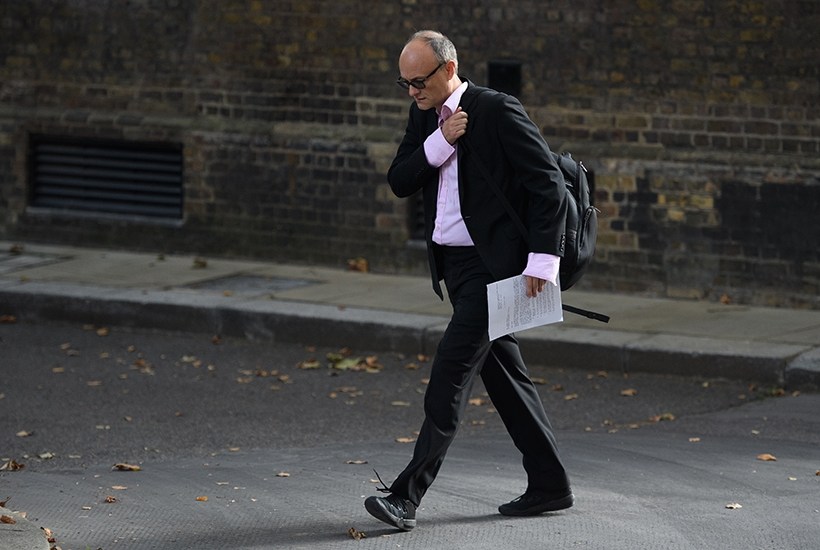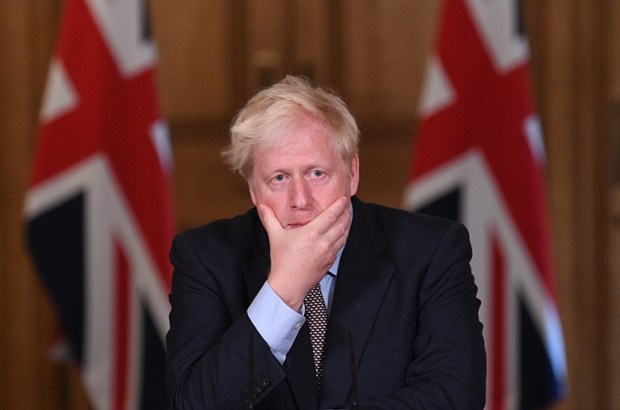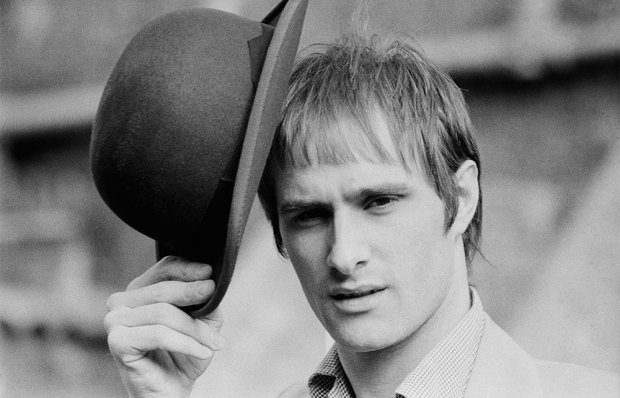There’s something about Dominic Cummings I will always like, and perhaps partly it’s the danger. I hardly know him well — perhaps at all, really — but will never forget an evening many years ago after a Times debate, when a few of us participants repaired to a restaurant called Fish near London Bridge. We sat up late, talking and drinking until we were just a handful; and one was Dominic. Hours with this arresting man sped by.
He reminded me of one of my heroes in politics, the late Sir Keith Joseph, though Cummings is relaxed and loose, and Keith could be stiff and shy. What they shared, though, beyond a beguiling intellectual confidence, was an appetite for stripping things back to first principles and following the logic. Both would lock straight on to the argument, heedless of the sensitivities, the ‘politics’, the personal risk or sometimes even the likelihood. There was no circumspection, no ‘what if we’re overheard?’, no ‘but how will this play with X, Y or Z?’ It was bracing to cross swords with such a mind, as in an Oxbridge tutorial, careless of the proprieties.
I had a dream last week, which I shall now develop. Only some of this was in the dream which, half-waking and half-sleeping for an hour, I then turned into a glimpse of a time maybe a century after we’re all dead.
It’s an Ozymandian scene. In a wasteland we encounter a fallen statue: a figure in a tracksuit. We resolve to research the life and career of this now obscure figure.
We find obituaries. All mention a then-famous email in the form of an internal Downing Street memo from Cummings, who was chief policy adviser to a long-forgotten prime minister, Boris Johnson. The memo was (wisely and perhaps intendedly) never actually sent, but reveals Cummings’s thinking. The subject heading was ‘Asking the unaskable — Why do we even need prime ministers?’ It runs:
‘The object of government is twofold: first to govern well, pleasing the people; secondly (and relatedly) to stay in power.
‘To govern well we need (a) careful, detailed, continuously refreshed data about what people want and expect from government, and (b) the finest available expert thinking/planning on how to turn these desiderata into policy, and how best to supervise its execution.
‘To stay in power we need continually refreshed polling data on the level of public satisfaction that policy-framers and executors are meeting in their work.
‘To sum up so far: successful government requires policymakers, experts, data–gatherers and pollsters.
‘But this is not to say there’s no role for leadership. Teams need leaders. Take health. From staff in hospital wards right up to the perm. sec. at the dept of health, and the sec. of state, there’s a place for leadership.
‘Team leaders need thorough, practical knowledge of the domain they supervise, whether it’s ICU ward at their local hospital, arms-length quangos and fiefdoms of the NHS or higher echelons of the civil service. The health sec. doesn’t need to know how to take a blood sample, but must know how healthcare is structured and who does what. Needs to understand dealings with treasury. Able to crack the whip, call for data, etc…
‘Thus the need for big departments of state, each with hierarchy of teams and a minister at its head who sees the wood but knows the trees. Each at each level answerable for their team, from ward matron to sec. of state.
‘So where does a PM fit in? Stupid answer is that he heads his own team called “the cabinet”. Honest answer is he/she has little idea what cabinet ministers are doing. Can’t have! Too much information. A few headline policy bullet-points in his/her head — “doubling Cov. testing”, “43 new hospitals”, but scratch surface and PM probably knows less than a newspaper’s chief health correspondent.
‘Yet in front of MPs/the media, etc, PM has to “take responsibility” and answer random, surprise Commons questions — relying on scribbled notes from health sec. or handed along from civil servants in Commons box. Or face grilling on PPE numbers from Andrew Marr. Then run off and meet foreign heads of state, open new shipping terminals, kiss babies, etc… It’s just a pantomime!!
‘“Ah,” say damn fool pundits with degrees in Constitutional Studies, waving copies of Bagehot’s The English Constitution (1865!! I ask you!), “but he’s in charge. He’s answerable.” Meaning what? How can PM be answerable to the electorate on PPE procurement — I mean, practically speaking? “Ah,” say pundits, “but PM’s also the morale raiser, rallying the citizenry… fireside chats on TV, etc.” Crap. Look at the data. PM’s ratings seldom improved by fireside chats. So 20th-century.
‘So is there any role for Downing St? Yes! A big, well-staffed department, plugged in to expert and technical advice, gathering daily polling data, with up-to-the-minute info on each department’s work, cracking the whip… this can be run as a professional operation, supervising the whole of government.
‘So PM’s department far from redundant. Only one redundancy here. The PM! Knows f**k all about what “his” own dept. is doing, let alone all the others. Nothing qualifies him for departmental management. Detached from everything, swinging in the breeze, facing hostile questions from every which way. “Rallying” figure? More often PM lowers morale because whole structure conspires to make him/her look pointless.
‘So who should answer for Downing St? Obvs the person actually across/in charge of its work, sort of CEO. Who’s head of state? The Queen. Head of government? Should be Downing Street CEO … need a better name. “Shepherd”? “National Shepherd”? “National Protector”? “Lord Protector”? … hm, has a ring. Heard it somewhere before.’
There’s a detail I forgot to mention from that Ozymandian statue: the fractured plinth, on it the carved inscription ‘Lord Protector’. But vandalised. Spray-painted across it in sun-bleached crimson: ‘Dominic Cummings — what were we thinking?’
Got something to add? Join the discussion and comment below.
Get 10 issues for just $10
Subscribe to The Spectator Australia today for the next 10 magazine issues, plus full online access, for just $10.
You might disagree with half of it, but you’ll enjoy reading all of it. Try your first month for free, then just $2 a week for the remainder of your first year.















Comments
Don't miss out
Join the conversation with other Spectator Australia readers. Subscribe to leave a comment.
SUBSCRIBEAlready a subscriber? Log in